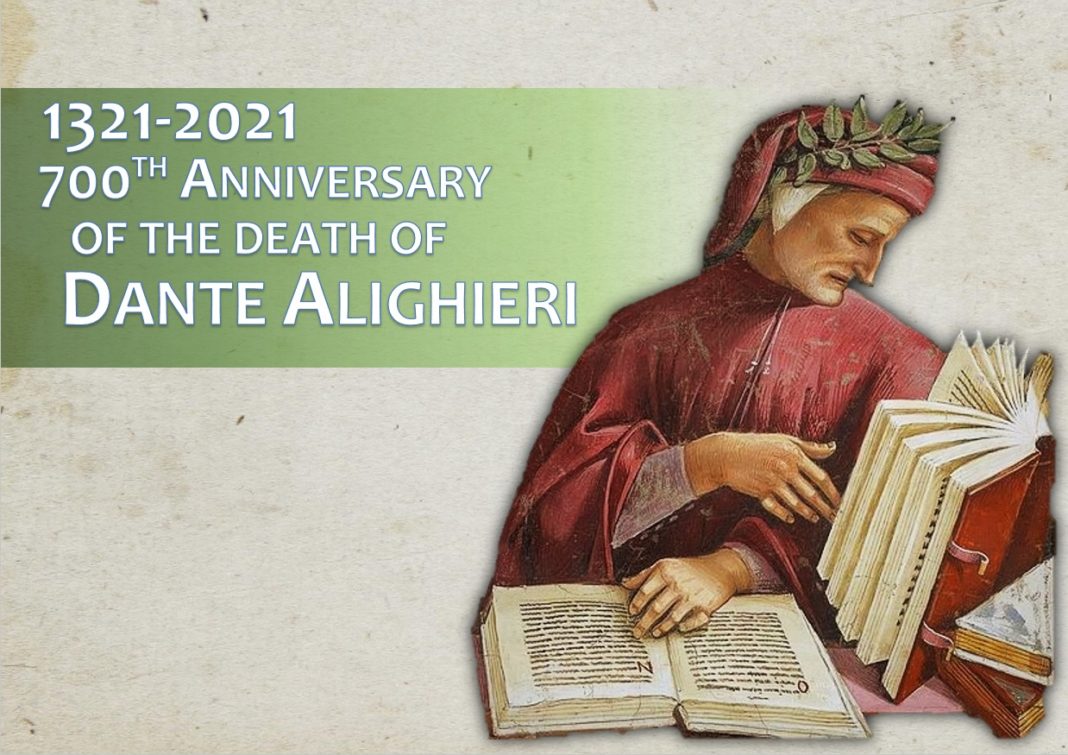Dante is universally known as the author of The Divine Comedy and he is also an “actor” in it. He wrote other works, but these are considered “minor” in comparison to this one.

created by Pietro Lombardo in 1483
From his time in Florence, we find verses in the comic-realistic genre, but above all, there are his love poems inspired by the “stilnovismo” [new style] movement, most of which he collected in a small book entitled Vita Nuova. “In this early work, which alternates prose with poetry, he celebrates his love for Beatrice, inaugurating the theme of selfless love. The object and end of the poem is the praise itself of the beloved woman, for which no event, not even her death, can in any way affect it. Towards the end of the book, Beatrice does, in fact, die, and in the last sonnet, the poet talks about a vision he had, in which he contemplated how glorious Beatrice was in heaven, and promised himself not to talk about her again, until he could ‘say things about her that have never been said about any woman’ (XLII).[1]
During the first half of his exile, he wrote new songs about love, which revealed a different and powerfully realistic style. He also wrote songs committed to doctrinal argument (commonly called the “moral songs”). There were also three works of prose, two of which were left unfinished: De Vulgari Eloquentia in Latin and Convivio in the vernacular. They date to between 1303 and 1307, before The Divine Comedy was written.
“The use of the vernacular for a philosophical treatise such as Convivio is a revolutionary act, consciously carried out by Dante, who gives the reasons for it in Book One. His intent is to spread knowledge—the true source of happiness for man, a rational creature—even among the non-literate (hence the title Convivio “The Banquet,” in which the author breaks the bread of knowledge with those who have not yet tasted it). At the same time, Dante felt challenged to demonstrate the intrinsic possibilities of the new vernacular, capable of expressing every elaborate concept on a par with Latin, and destined to supplant, as a ‘new sun’ the ‘old sun’ which is setting.”[2]
The other essay, De Vulgari Eloquentia, was written in Latin, because it was addressed specifically to men of letters. It aimed to give “vernacular eloquence” the same dignity due Latin. Dante took the same rules that regulated the ancient Latin language and applied them to the vernacular, thus making it capable of singing the loftiest arguments, even those reserved for the tragic style.
Dante’s third important prose work, the only one completed, was his essay on the monarchy. In it, he exposed his political doctrine, all centered on the problem of the relationship between the Church and the Empire.
Dante also wrote thirteen epistles, of which three were written on the occasion of the descent of Henry VII, Emperor of the Holy Roman Empire, into Italy. One of these letters was addressed to the Italian cardinals during the conclave of 1314 to plead the cause of the return of the pope to Rome. In another, he offered a copy of his third canticle of The Divine Comedy [Paradiso] to the Lord of Verona, Francesco della Scala, also called Cangrande.

It was precisely in this last letter, Epistle XIII, that Dante declared the title of his major work (The Comedy of Dante Alighieri, Florentine in birth, but not in manners (28 [10]) as well as its very purpose: “The purpose of the whole work, and of the part, could be multiple, that is, near and far. However, omitting such a subtle investigation, one can say in summation that the purpose of the whole as well as the part is to remove those living in this life from the state of misery and lead them to the state of happiness” (39 [15]) .
In The Comedy, Dante’s genius finds its fullest expression. This is the work that made Dante’s name as famous in today’s world, as it was in Italy during his own day, starting a few years after his death. The adjective “Divine” was attributed to The Comedy in Boccaccio’s Trattatello in laude di Dante., [Brief Essay in Praise of Dante]. However, it only occurs in the prestigious edition edited by Ludovico Dolce and printed in Venice by Gabriele Giolito de’ Ferrari in 1555. That was when the work was first called The Divine Comedy, the title it is has been known by ever since.
[1] Anna Maria Chiavacci Leonardi, Dante Alighieri. Invito alla lettura, Cinisello Balsamo, San Paolo, 2001, pp. 11-12.
[2] Ibid. 12














